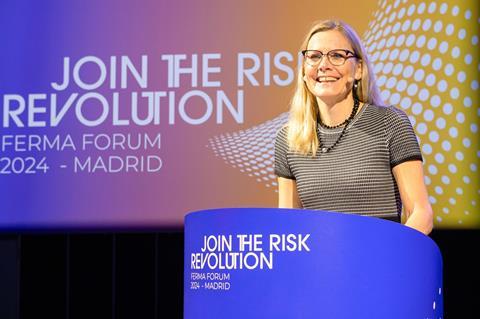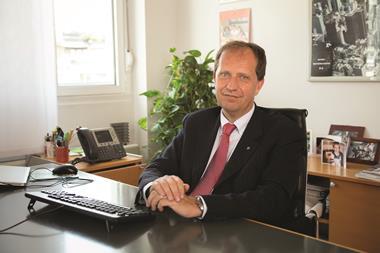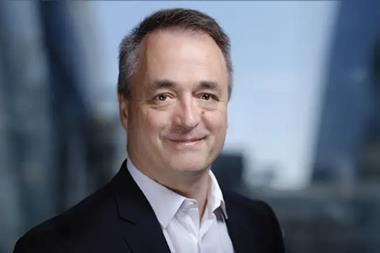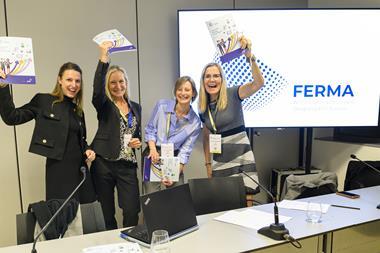The world of risk is changing and risk management needs to change too, says FERMA president Charlotte Hedemark, opening the conference in Madrid.
“The theme of this year’s FERMA Forum is: Join the Risk Revolution”, exclaimed president Charlotte Hedemark, opening the conference in Madrid.
The idea, she explained, is to embrace a transformative approach to risk management. This reflects a shift in mindset from old-school, reactive methods to a more proactive, strategic and integrated approach.

She said: “The idea of revolution encourages us to think of the ways we can and must adapt to rapidly emerging risks, like cyber threats, climate change and the potential challenges of AI.”
She believes it should incite risk managers to step into a more collaborative, strategic role, becoming central to their organisations, working across functions and with leadership, contributing to long term resilience and growth.
“This is a call to action. A rallying cry to us all”
She added: “Risk revolution makes us think of innovation and agility - we need to find ways to respond to risks in real time, but also to adopt new tools and solutions, like AI or advanced data analytics to improve risk detection, prediction and mitigation.”
Finally, she hoped theme would prompt delegates to think about a change in culture, moving towards one where risk awareness is embedded across organisations and all colleagues understand the importance and value of proactively managing risks.
She said: “This is a call to action. A rallying cry to us all to actively participate in reshaping and redefining risk management to meet the demands of an increasingly complex, interconnected world.”
The changing landscape
Hedemark then addressed the changing nature of the risks businesses are facing, noting that the landscape is very different to when FERMA was founded 50 years ago.
Organisations now face a rapidly changing and interconnected set of risks, driven by technological advancements, a climate crisis and geopolitical instability.
She said: “Resilience and adaptability are key to managing these evolving threats. Risk Managers today are faced with the twin challenges of responding to immediate, short-term shocks at the same time as integrating longer term concerns, like adapting to climate change and the green transition.”
The role of the risk manager
As the risk landscape transforms, so too does the role of the risk manager, as evidenced by the headline findings from the Global Risk Manager Survey.
Hedemark said that in particular, the role and its responsibilities were expanding to address today’s complex environment.
She cmmmented: “The survey shows that the need for a robust strategic risk management framework has never been clearer. Some 91% of risk managers said they are engaged in corporate strategy to some extent, underlining the way the role has moved from an operational to a strategic one.”
The survey also shows that the modern Risk Manager is dealing with both insurable and, increasingly, uninsurable risks like sustainability, climate change, cybersecurity, regulatory compliance and the social aspects of ESG policies.
“The survey shows that the need for a robust strategic risk management framework has never been clearer.”
She added: “The number of risk managers who are involved in assessing ESG risks has grown hugely since the last survey… As ESG concerns become ever more critical, it is the Risk Manager who must take a lead in integrating these goals into risk frameworks.”
Risk managers today understand the need and the opportunity inherent in leveraging technology and data to help predict, quantify and mitigate risks, often in real time, and improve efficiency.
She said: “In fact, investing in digital risk management tools is the second most important priority of risk managers over the next 1 to 2 years. But there are new challenges here too - almost all risk managers said they are working on AI-related risks.”
Another interesting finding is that Risk Managers today collaborate more than ever before across their organisation, in particular with IT and sustainability functions. This often requires engagement with external stakeholders, such as regulators or industry bodies.
Hedemark commented: “This is another sign of how our profession has evolved and continues to grow in strategic importance. The study clearly highlights the increasing focus on building organisational resilience, not only mitigating risk, and the important role Risk Managers are playing in promoting a risk culture.”
“The number of risk managers who are involved in assessing ESG risks has grown hugely since the last survey”
Of course, the survey also looked at how organisations are adapting their insurance strategies. Unsurprisingly, more than half of respondents said that risk retention was a primary part of their strategy, with a third saying they were using captives as part of an overall risk management plan. Other alternative solutions like parametric covers are also gaining traction.
Troublingly, however, more than half of the risk managers fear that some risks or activities will soon become uninsurable. Hedemark said: “More than 50%! Just let that sink in. Climate change, cyber-attacks and supply chain risks were top of respondents’ minds here.”
She finished by telling the audience that FERMA is committed to equipping Risk Managers with the tools and frameworks needed to adapt to the changing risk environment. For instanced, the ERM committee is developing practical, risk management guidance to empower Risk Managers to influence decision-making at the highest levels.
Other initiatives of note include the newly established foresight committee, and the now well-established Rimap certification process.
Hedemark concluded: “Over the past 50 years, the risk management profession has evolved rapidly. The strategic actions we are taking at FERMA reflect our commitment to addressing the needs of Risk Managers across Europe while navigating this change and readying ourselves for the next 50 years.”














No comments yet